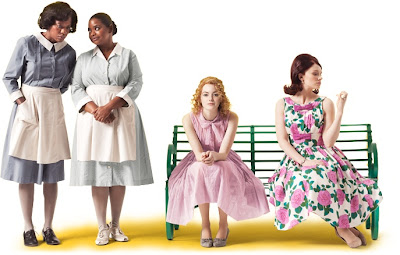In Kathryn Stockett’s The Help, when Skeeter Phelan sits down at Aibileen Clark’s dining room table for the first time, she asks two key questions about her life as an African-American housemaid in Mississippi in the 1960’s.
Question 1: “Did you know when you were a girl, growing up, that one day you’d be a maid?”
Question 2: “Did you… ever have dreams of being something anything else?”
In the novel, Aibileen’s answers are simple and abrupt: “Yes Ma’am. Yes, I did” and “No Ma’am I didn’t.” But in the 2011 film adaptation, directed by Tate Taylor, Aibileen is not so certain.
Standing at her kitchen sink, Aibileen’s eyes are full of lost hope and sad resignation – her answer to Skeeter’s second question was only a slight tip of her head, an acknowledgement that yes, she had dreams for a better life.
The change is small, yet significant. It sets the tone for the entire film.
Where Stockett stayed true to the harsh, brutal realities of the South, Taylor opted for some Hollywood romanticism and idealism. Where Stockett weaved her story through an ever-present darkness, Taylor injected some light.
The time limitations of film always necessitate the sacrifice of important back-stories and plotlines, but Taylor went to the extra length of watering down some of the darker sides of the novel.
The story of Skeeter’s own maid Constantine, in particular, is heavily glossed over. Then there’s Skeeter’s relationship with Stuart, which is simplified to no more than a brief fling.
Skeeter’s relationship with her mother also takes on more light than shade in the film – which results in a much more likeable and morally upright Charlotte Phelan – and Minny Jackson’s abuse at the hands of her husband is hidden from the audience’s eyes.
While some fans of the book may lament these changes, I was grateful for them. It’s one thing to read about the lives of these women, but it’s a whole other thing to see the pain etched in the lines of each character’s face.
If each humiliation and heartbreak was to be played out on the screen, page by agonizing page, this film would have made for a very depressing viewing experience. As it is, even with the light of the Mississippi sunshine streaming through, there are still scenes that will have you rubbing away an ache in your throat.
The lows could scrape the bottom of any barrel, but it is the highs of this film that keep the audience entranced. Thank heavens for the quirky Celia Foote, who is a breath of dizzying fresh air in the film, just as she is in the novel; and praise be Minny Jackon’s chocolate pie, that will consistently rouse the most demoralized audience into fits of laughter.
Thanks also to the new and improved Charlotte Phelan – there was nothing more gratifying in this film than her insults, which sent Hilly Holbrook skipping right off the front porch.
For me, the power of both the film and the novel came through their honest depiction of the human characters, flaws and all. Stockett has a great talent of writing the voices of her characters – Aibileen, Minny and Skeeter were projected so clearly off the page, that one barely needed the chapter headings that identified which character would be sharing their perspective.
In the film, it is the acting that projects these characters forward and makes them real. Viola Davis is superb as Aibileen and Octavia Spencer deserved the Oscar for her portrayal of Minny - other clear standouts were Bryce Dallas Howard and Sissy Spacek, you had dynamic chemistry as the warring mother and daughter duo, Hilly Holbrook and Mrs Walters.
When Aibileen reassures Minny that “we ain’t doing civil rights, we just telling stories like they really happen,” the audience is reassured along with her. Although fictional, it is the personal stories that make this story matter, because they feel so real.
This story is as important as it is entertaining, as enlightening as it is heartbreaking. Read the book, watch the film – devour both, in any order.
The verdict:
Book or Big Screen? Book
The film is: 4. A fine adaptation that maintains the original’s exceptional qualities
I would be very happy to receive your comments and feedback on ‘Book or Big Screen’ – please click on the below link to tell me what film adaptation you are excited about, or to suggest the book/film that I should review next. What’s coming next? A review of The Hunger Games

Excellent review and summary of the film and book Danielle. I still haven't watched the movie yet but I definitely want to after reading this. The book is so good, it's reassuring to know that the filmmakers haven't damaged it too much. And I agree, it would be very difficult to watch certain scenes if it did stay true to the book every step of the way.
ReplyDeleteMegan @ Storybook Love Affair
Thanks Megan! The subject matter of the book was so heavy at times, I admit that at first it felt strange to see the sun shining in the movie... It is very well done though, I highly recommend it. Thanks for stopping by once again. D
ReplyDeleteLove this movie - it was so thought-provoking and just... wonderful. My mom and I saw it in theaters and walked away with a well-spent theater ticket.
ReplyDeleteNice movie!!
ReplyDelete